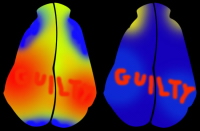Forensic Cognition
 Following on from the cognitive profling item posted yesterday, I thought I'd draw your attention to an excellent cognitive psychology resource.
Following on from the cognitive profling item posted yesterday, I thought I'd draw your attention to an excellent cognitive psychology resource.Cognitive Daily reports on fascinating peer-reviewed developments in cognition from the most respected scientists in the field.
The blog is maintained by Dave Munger and Margaret P. Munger who note that the research they feature isn't dumbed down, but it's explained in language that everyone can understand, with clear illustrations and references to the original research.
This is a must bookmark resource for anybody interested in the application of cognitive psychology within a legal context as the site regularly features research that has implications within the criminal justice system. For instance, a recent feature wonderfully entitled 'When crime-fighting tools go bad: Problems with the face-composite system' examined research into face perception and memory to investigate what happens when a suspect is captured and the witness is asked to identify the real perpetrator in a lineup? Does the witness remember the actual face they saw at the crime scene, or the composite face created at the police station?
Click Here To Read The Article in Full




